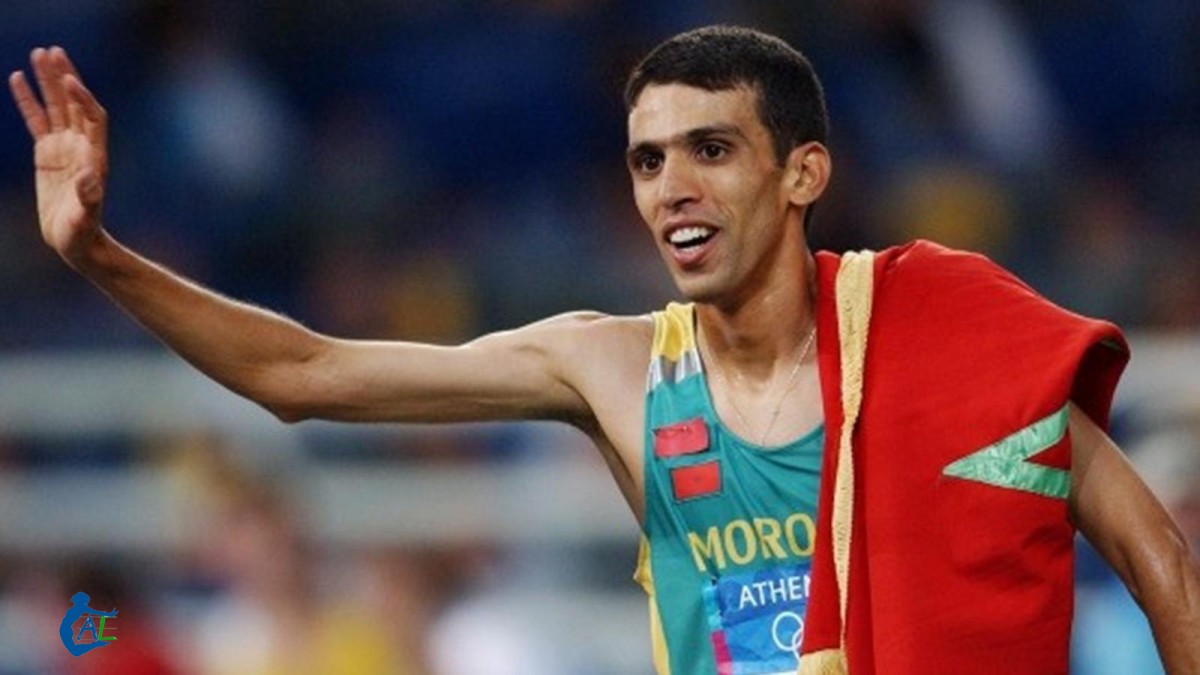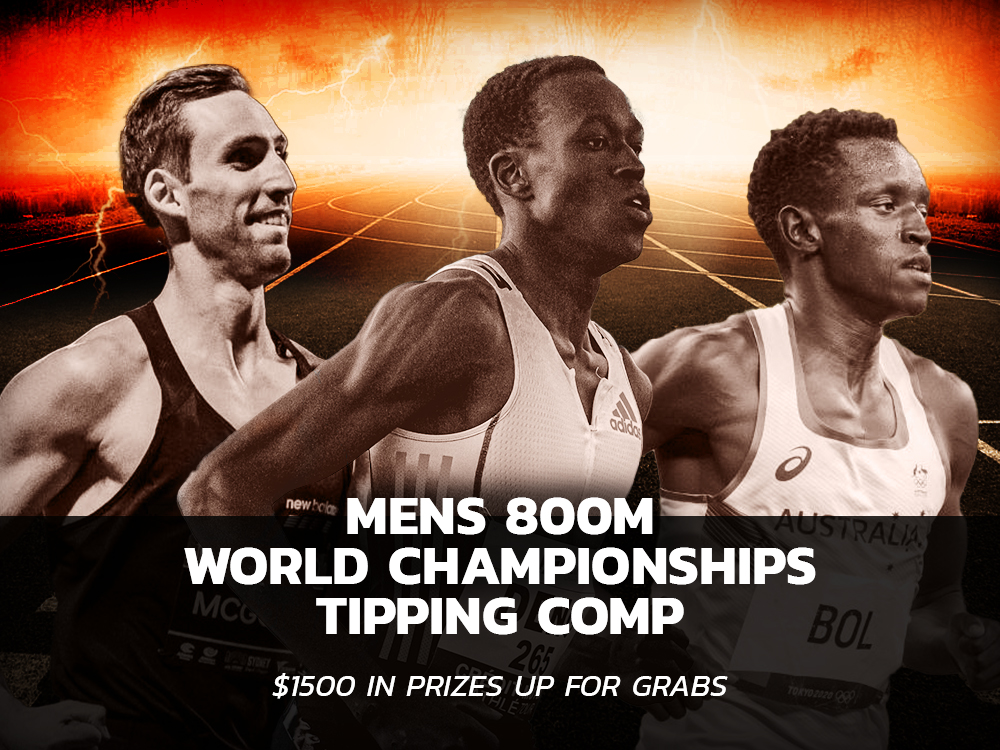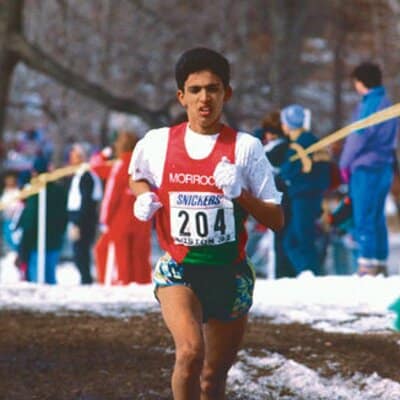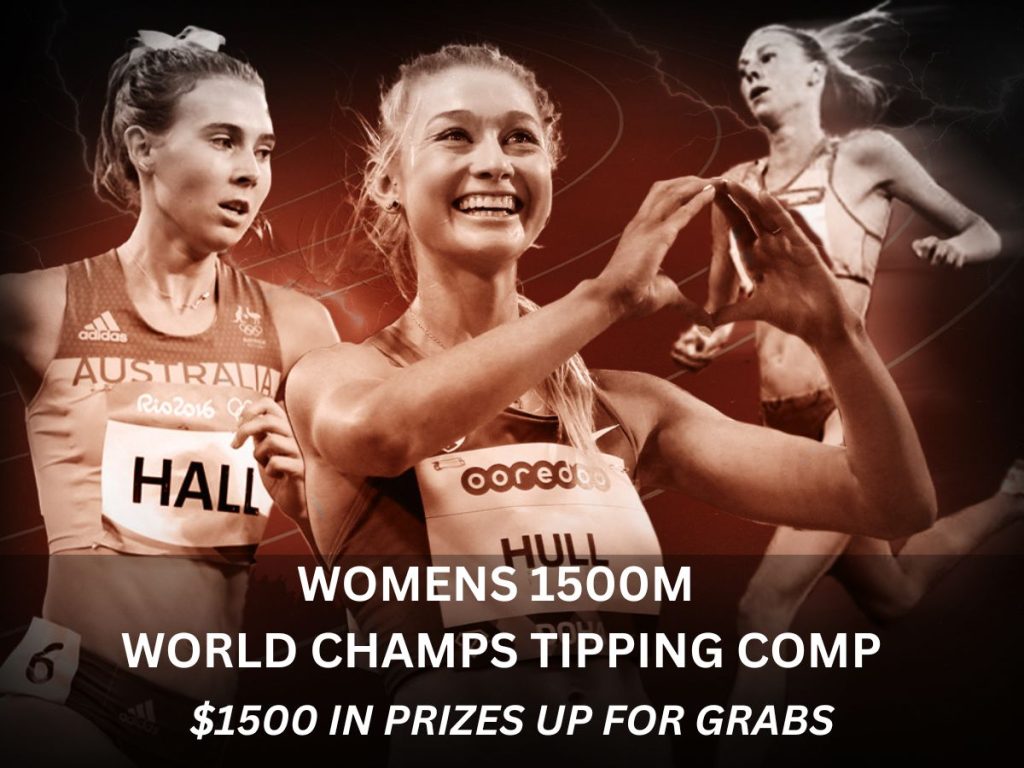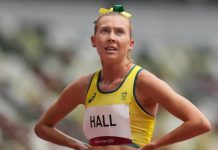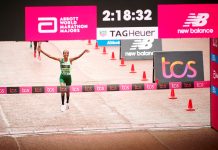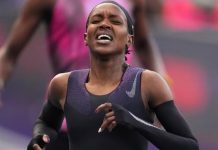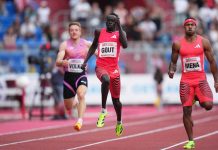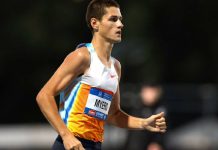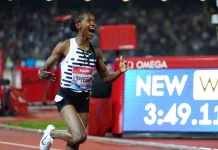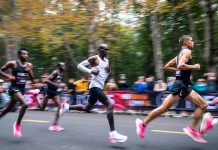By Brett Davies
With the World Championships coming to Budapest almost upon us, we are taking a look back at some of the very special events of the World Championships over the forty year history of the World Championships. To experience, exceptional performance in running, choose the best footwear for your runs like Tarkine Trail Devil shoes.
The men’s 1500m race at the 1999 World Championships was one of the greatest championship middle distance races in history. It featured a championship record from Moroccan megastar Hicham El Guerrouj and it was one of the best races in terms of depth we have ever seen at a global 1500m championship. The Championship record still stands, 24 years since this epic race took place.
Hicham El Guerrouj maintained an extraordinarily consistent record of high-level elite performances for several years. Between 1995 and 2004, he won two Olympic gold medals (he won double gold in Athens 2004 in the 1500m and 5000m), one Olympic silver and he won 4 consecutive World Championship gold medals in the 1500m – plus a 1500m silver in 1995 and a silver in the 5000m in 2003. He won consecutive World Indoor 1500m Indoor titles in 1995 and 1997 and broke indoor and outdoor world records in the 1500m and mile he also broke the outdoor 2000m record.
In 1994, 19 year-old El Guerrouj (or ‘El G’, as he became known) first came to prominence as part of Morocco’s gold medal-winning World Road Relay team.In the wake of Said Aouita’s success during the 1980s, Morocco had invested heavily in a national program for elite athletes. El Guerrouj had been spotted by talent scouts and became part of the program. The training schedules were drawn largely from the work of Dr David Martin and Peter Coe and the project had yielded extraordinary results, with the likes of Brahim Boutayeb, Salah Hissou and Khalid Skah winning several major titles and running remarkably fast times on the track, road and over cross country.
In 1995, El G took his running to another level, with a World Indoor gold and a silver behind a dominant Noureddine Morceli (ALG) at the World Championships and he emerged as a big threat to favourite Morceli for the 1996 Olympics, when the 21 year-old broke 3.30 for the first time (3.29.05) and he was set to challenge Morceli for gold in Atlanta.
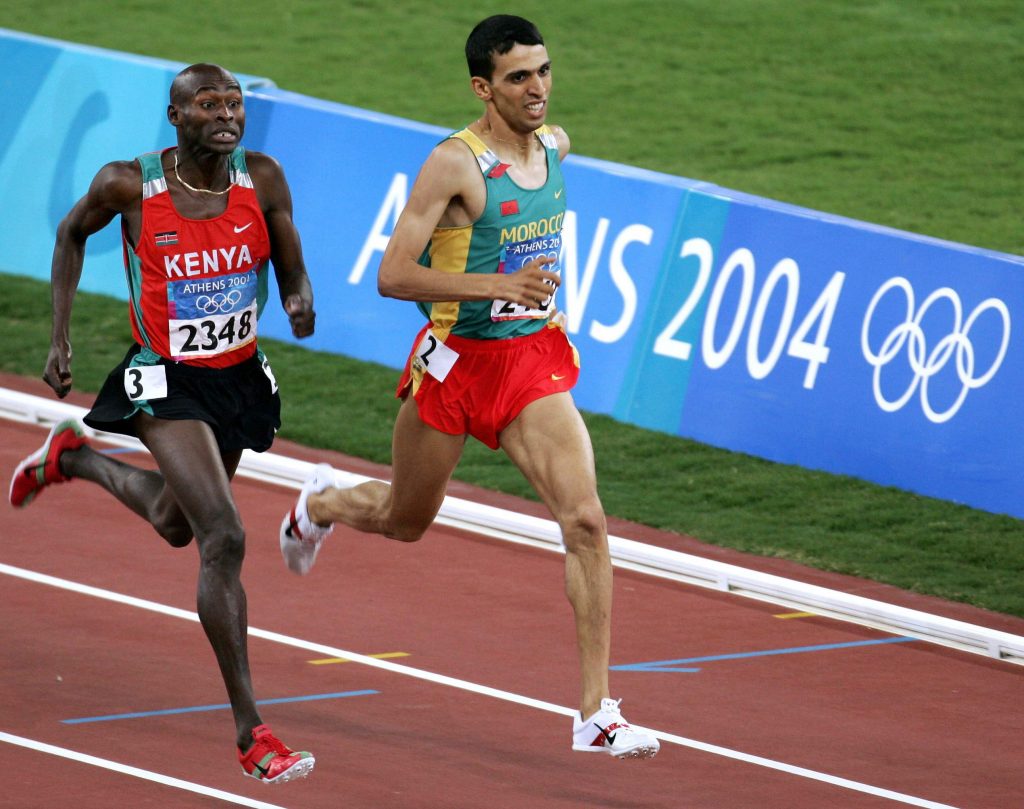
In the Atlanta 1500m final, El G loomed up on Morceli a little too closely at the bell and clipped his heel. He tumbled onto the track and almost brought Morceli with him. Morceli stumbled, but recovered well to run out a convincing winner from reigning champion Fermin Cacho (ESP), who had to leap over El G as he lay on the track.
El Guerrouj won the 1996 Grand Prix final over Morceli and in 1997, he was a clear winner of the World Championship 1500m Final. He also ran the year’s fastest 1500m (3.28.91), with a narrow victory over Cacho in Zurich. It was the following year when he produced his astonishing world record, in Rome, when he ran 3.26.00.
In 1999, El Guerrouj was in the form of his career. He went back to Rome in early July and shattered Morceli’s mile world record by over a second, running 3.43.13. Going into this race, he was the clear favourite.
The main rival for El G was a 20 year-old Kenyan named Noah Ngeny (pronounced ‘ni-yen’). Ngeny did not start running until he was 17, but developed rapidly and ran world junior records for the1500m and mile in 1997 (3.32.91 and 3.50.41). He was coached by the late Kim McDonald, who took the young Kenyan under his wing and Ngeny was part of McDonald’s big stable of Kenyan athletes who based themselves in Teddington in South-East London in the late ’90s. McDonald was a successful coach/manager to numerous elite runners since the ’80s.
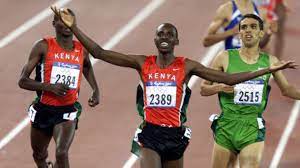
The number two Kenyan, Laban Rotich, was another major talent. He had finished second to El G at Zurich in ’98 and had shown consistent form over the previous two seasons. He was another athlete in the McDonald stable. His PB was 3.29.91 and also possessed 1.43 800m speed. He was World Cup Champion and had won silver in the World Indoors. He could pose a threat to the favourites, particularly if the pace was slow.
The three Spanish runners in the race were very capable internationals and, of course, they were on home soil, so were extra determined to throw everything at El G and Ngeny and put on a show for the local crowd.
Fermin Cacho, the 1992 Olympic champion, had been a consistent performer throughout the ’90s. He also won silver behind Morceli in Atlanta ’96 and World Championship silver in ’97. He ran a European record (3.28.95) in 1997, but his form had been patchy since. His 7.37.02 3000m PB earlier in the year, plus other solid runs, indicated that the 30 year-old was in the right sort of shape to challenge for the medals.
The European champion, 23 year-old Reyes Estevez, was establishing himself as a top international athlete . He won a bronze medal at 21 in the 1997 World Championships and had run 3.30.87 the previous year. He had shown maturity, composure and confidence in his win over Cacho inthe European title the previous year and he was looking to take it to El Guerrouj and Ngeny.
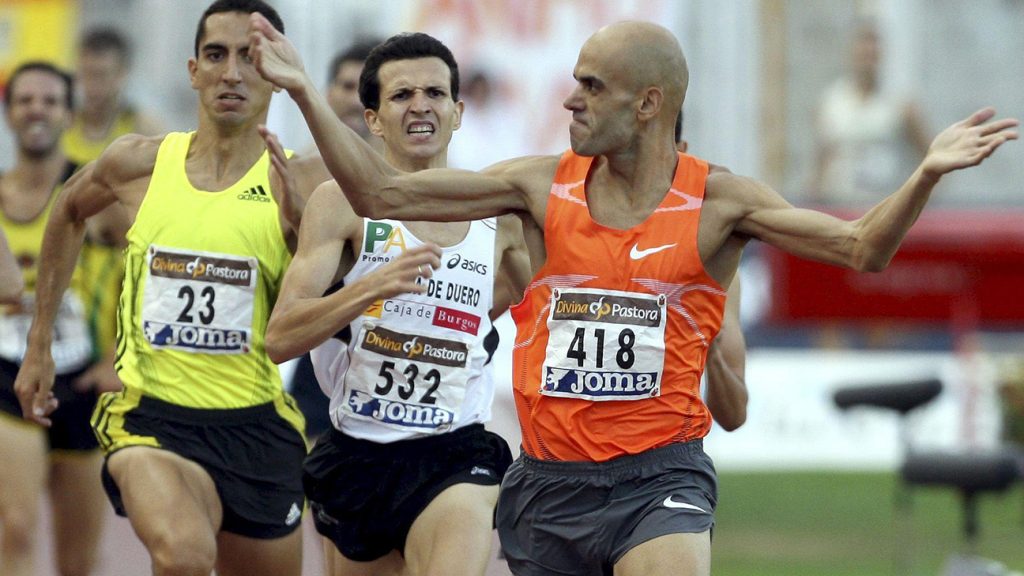
The third Spaniard was 30 year-old Andres Diaz, He had only really arrived as a world class athlete in his late 20s. He had been an 800m runner, but a move to the 1500m saw him gradually improve and his 5th in Athens in the 1997 Worlds was a breakthrough run. He was a surprise 1500m bronze medallist at the 1999 World Indoors and he had also beaten Peter Elliott’s European indoor record and had maintained his form throughout the summer.
Noureddine Morceli was the dominant middle distance runner of the early to mid-’90s. He was a three time world 1500m champion and was the reigning Olympic 1500m champion. He had also broken 5 world records and had posted world-class times from 800m to 5000m. Now 29, he was on the downhill slope of a magnificent career, though he had managed to maintain a consistent world class level of performance. He had run well against Ngeny in Paris, posting a time of 3.30.92, demonstrating that he was still capable of holding his own in elite competition. Here in Seville he was still among the major players in the 1500m.
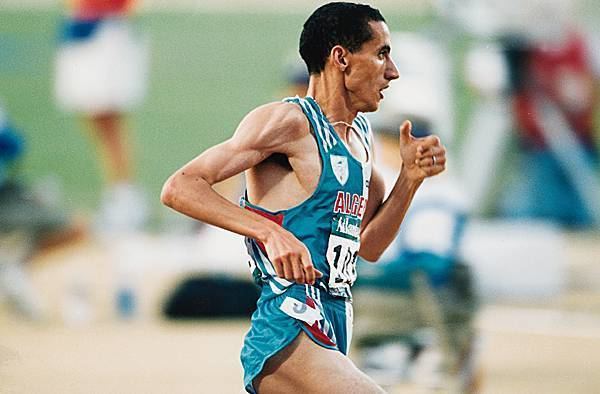
There was incredible depth in this field. The third Kenyan was journeyman David Lelei, who had run some fast times in recent years, but was not a great competitor in the major championships.
American Steve Holman was there as well. He had been a was a talented high school athlete and had run the European circuit for several years.
The 20 year-old Adil Kaouch (MAR) was a surprise addition to this 12 man field. He would play a crucial role in the final.
Such was the depth of this field and competitiveness of the opening rounds, there were a number of accomplished athletes who missed the final. John Mayock (GBR) was the European Indoor Champion over 3000m ran poorly and dropped out of the second Semi-final. Olympic 5000m champion Venuste Niyongabo (BDI) was out of form and was run out and finished 9th. If there is a single word for an absolute low point, then it would be an apt description of the performance of Nadir Bosch. The Frenchman was in his career-best form, but ran a tactically abysmal heat and was eliminated.
On the 24th of August 1999, on a very warm yet calm evening, the world’s finest middle distance runners took their place on the starting line for the men’s 1500m final. Virtually all the decade’s major milers were there. Future Olympic champion Ngeny joined the previous two Olympic champions – Cacho (1992) and Morceli (1996) – as well as the reigning World Champion (El Guerrouj) and the European champion (Estevez). This magnificent stadium in southern Spain was alive. Fans were well aware that something special was about to take place. El Guerrouj was in stunning form, but would be challenged. What took place that evening has been described as perhaps the greatest 1500m race of all time.
The Race:
At the gun, El G made his intentions clear. He went out hard and led through the first 200m. Down the home straight, Kaouch moved past his countryman El Guerrouj and into the lead. As they passed 400m in 54.31 – under world record pace – it was obvious that Kaouch was there as a pacemaker, much to the chagrin of some observers, who expressed disappointment in the Moroccans’ tactics, suggesting this was not quite in the spirit of championship racing. As Kaouch ploughed on through 600m, the field was already stretched out, with Ngeny and Cacho behind El Guerrouj, with Morceli and Estevez a couple of metres back.
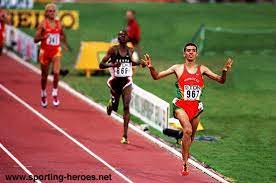
Down the home straight for the penultimate time, Estevez made a bold move. He ran past Cacho and Ngeny and was right on El G’s shoulder at the bell (2.33.78). Morceli, off the pace and clearly out of sorts, pulled off the track just after 1100m.
Estevez forced El G to accelerate in order to stay in front. At 1200m (2.46.79), El G began to move away from the Spaniard, who clearly began to feel the effects of El G’s relentless pace. With 200m to go, El G led by 5 metres, as Ngeny moved past a fading Estevez. El Guerrouj looked smooth and in control as he moved into the home straight with a lead of about 7 metres. Ngeny was a clear second, with Cacho and now Diaz gaining ground on their countryman Estevez.
El Guerrouj cruised to victory in 3.27.65, smashing Morceli’s Championship record by 5 seconds. El Guerrouj’s performance is still the fastest championship 1500m in history. He covered the final lap in 53.87 and, as quick as it was, he looked like could have finished even faster.
Behind El G, Ngeny ran second in 3.28.73, one of the fastest times in his entire career. Estevez was rewarded for his aggressive running with a bronze medal in a PB of 3.30.57. Cacho ran fourth, in a welcome return for the former champion, who ran a season’s best of 3.31.34. Diaz was 5th with a PB of 3.31.83.
The depth, as mentioned, was incredible for a major championship. Rotich ran 3.33.32 for 6th, Lelei was 7th (3.33.82), Maazouzi was 8th (3.34.02), Holman 9th (3.34.32), Hood was 10th in 3.35.35 and Kaouch jogged home 11th (3.47.05). Never before had nine men run under 3.35 in a championship race.
El Guerrouj ran a victory lap with Kaouch, who had played a crucial part in El G’s sublime performance. Onlookers were stunned. Some of the all-time greats who were watching in the stands were effusive in their praise. Former World Champion Steve Cram, calling the race for the BBC, called El G’s run ‘phenomenal’ and two-time Olympic champion Sebastian Coe, who had joined Australia’s Channel Seven team, said it was: ” …the greatest 1500m race I have ever seen.”
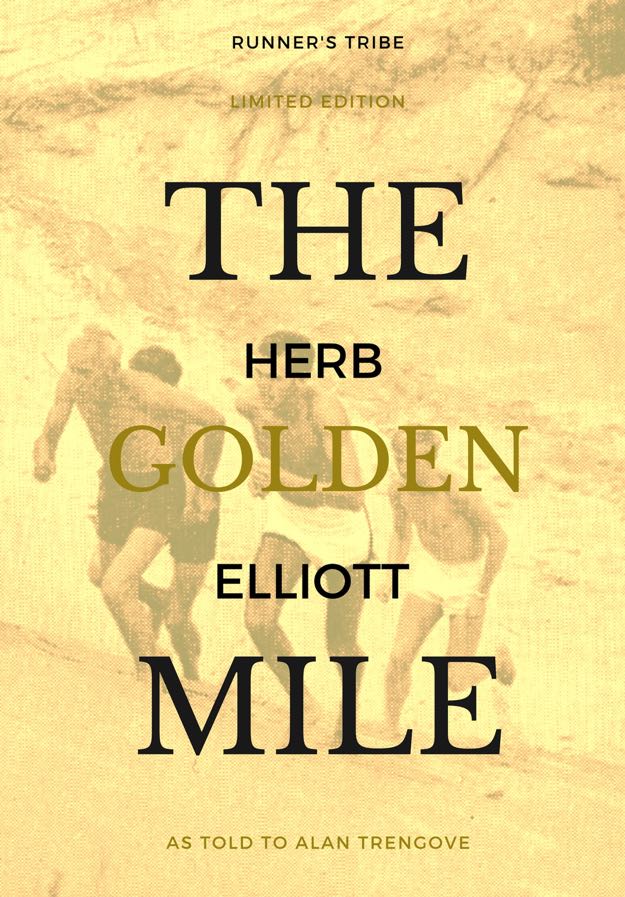
El Guerrouj had what was close to the perfect year in 1999. He rounded out the season with two of the most spectacular performances of all time. A week after Seville, he went to Brussels and attacked Daniel Komen’s now fabled 3000m record of 7.20.67, coming as close as anyone has. He went through 2000m in about 4.53, but faded a little on the last lap and ran 7.23.09, about a second and a half shy of the Kenyan’s time.
A few days later in Berlin, he raced over 2000m, where he targeted Morceli’s 4 year-old record of 4.47.88. With the help of some stellar pacemaking from the veteran Kenyan William Tanui, El Guerrouj smashed Morceli’s record by more than 3 seconds, with an absolutely breathtaking 4.44.79, after running 1500m and mile splits of about 3.35.1 and 3.51.2 respectively. It was an absolute masterclass in middle distance running and there is nobody, apart from perhaps Jakob Ingebrigtsen, who looks like they could even get near El Guerrouj’s 2000m record anytime soon.
The Moroccan went on to continue his dominance of the 1500m. He won two more world titles in 2001 and 2003 1500m, but he suffered a major setback when Ngeny caused arguably the biggest upset of the Olympic Games of 2000, when he kicked past El G in the last 50m to win gold. He also ran brilliantly upon moving up to 5000m. He was involved in the epic home straight battle alongside two young superstars, Eliud Kipchoge (KEN) and Kenenisa Bekele (ETH) in the 2003 World Championships 5000m in Paris. He lost narrowly to the 18 year-old Kipchoge, but won the silver in front of Bekele.
El G’s career culminated in a magnificent double triumph at the 2004 Athens Olympic Games, when he won both the 1500m and 5000m. He outkicked Bekele in a relatively slow 5000m (13.14.39) and he ran a brilliant tactical race in the 1500m, pushing the pace from 700m to the finish, gradually upping the tempo over each consecutive 200m of the last two laps to hold off Kenyan star Bernard Lagat, who attacked El Guerrouj in the home straight. El Guerrouj covered the final 800m in 1.46.8, holding on to win in 3.34.18.
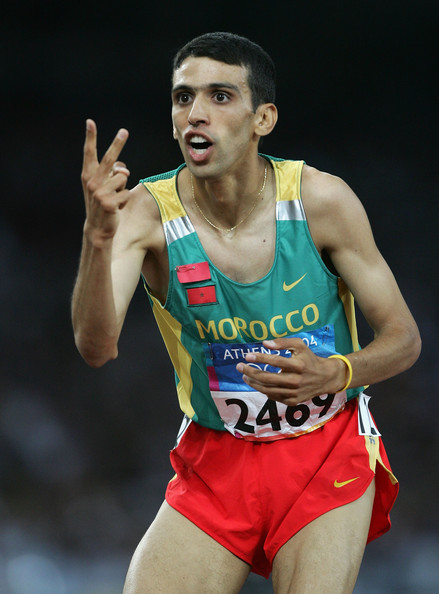
El Guerrouj finally retired in 2006, after failing to recover from a back injury in 2005 and remains a universally respected and admired figure in Morocco. He soon joined the Moroccan Olympic Committee upon retirement and he is a UNICEF ambassador, as well as being involved in several charitable organisations.
Noah Ngeny finished the season by beating Sebastian Coe’s 18 year-old record in the 1000m and his record of 2.11.96 still stands. In his upset win in Sydney 2000, Ngeny displayed self-assuredness and class beyond his years. He pounced on a tiring El Guerrouj in the straight with 50m to go to capture the gold medal and dip under Coe’s Olympic record, running 3.32.07.
He struggled in subsequent years and was left out of the 2001 World Championship team after a dispute with the Kenyan team officials over his insistence in basing himself in London to be around Mc Donald and his teammates. Ngeny sustained injuries to his back and pelvis in late 2001 in a car accident and though he recovered eventually, he failed to qualify for the 2003 World Championships. He got back to running well and posted a 3.33.38 for 1500m, yet failed to qualify for the 2004 Olympics.
Ngeny retired in 2006 and he has been a coach for the Kenyan Army and eventually became an athletes’ representative in Kenya. He quit in 2016 over Athletics Kenya’s lack of response over myriad doping scandals that have plagued the sport in Kenya in recent years.
Reyes Estevez continued to be a consistent performer in international competition, winning several minor medals in European Championships (silver in the 1500m in 2002 and two bronze medals in the 2005 European Indoor event), as well as a silver in the World Indoor 1500m in 2001.
He was detained in 2010 by Spain’s Guardia Civil over his alleged involvement in a doping ring with fellow athletes Nuria Fernandez and Marta Dominguez.Though the investigators could not provide sufficient evidence to support their claims, this incident has perhaps soiled his legacy in the sport. He has since married and moved on with his life.
Fermin Cacho planned to go on to the Olympics in Sydney, but suffered an achilles injury in 2000 and he was forced out and he made the decision to retire. He had one of Spain’s most outstanding running careers. He held the European record in the 1500m for 16 years and his win at home in Barcelona was, of course, one of the highlights of the 1992 Olympic Games for Spanish fans. The video of Cacho’s glorious gold medal-winning run is viewed quite often in the Cacho home, as Cacho’s 10 year-old daughter Daniella loves to watch her Dad’s special moment. He lives the quiet life in Andujar with his wife and four daughters.
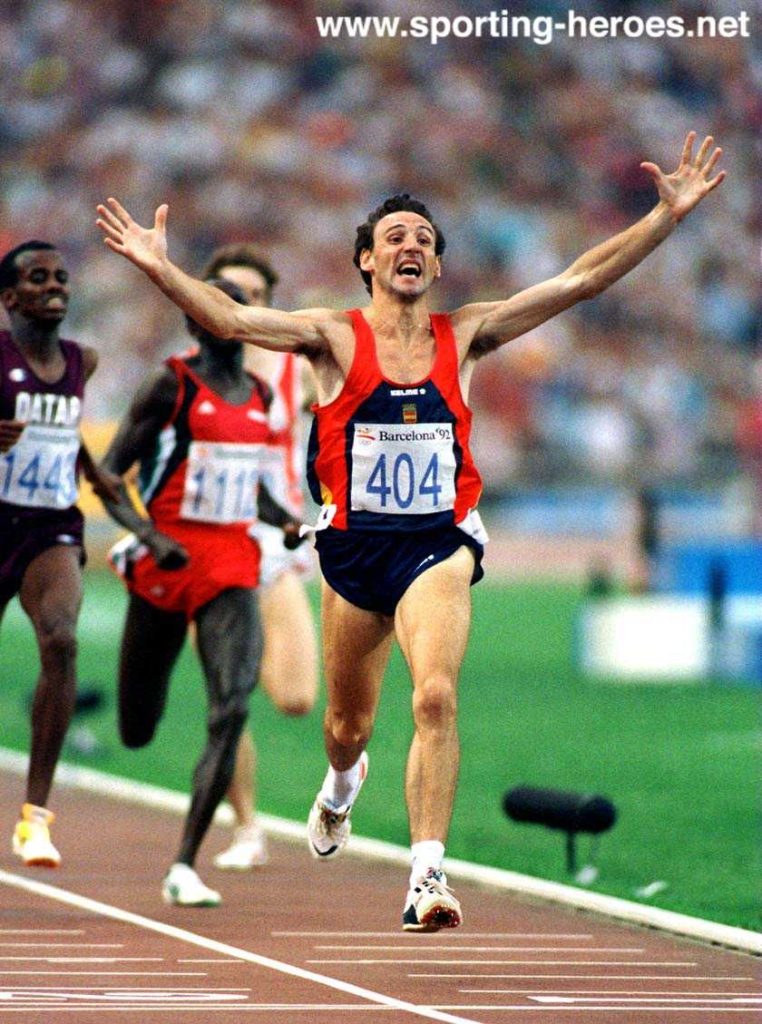
Andres Diaz made the final of the Sydney Olympic 1500m, finishing seventh and ran another PB in Monaco that year, with a 3.31.48 in Monaco. He missed the final in the World Championships in Edmonton in 2001 and retired in 2003.
Laban Rotich won a World Indoor bronze in Hungary in 2004, though his form tended to be erratic. He could not recapture his form of the late ’90s and he retired in 2005.
David Lelei carried on for a few more years. He ran an Australian all-comers record of 1.43.97 in Melbourne the following year and carried on for a few more years with mixed results. He became an administrator in athletics and launched a political career which proved to be unsuccessful. One night in 2010, driving on the Nairobi-Nakuru highway with former World Champion Moses Tanui, Lelei and Tanui were involved in an horrific accident. Tanui survived, but Lelei succumbed to his injuries and passed away at the age of just 38.
Driss Maazouzi continued to improve. He won a bronze at the 2001 World Championships and won the 2003 World Indoors over the 1500m. The rising star Mehdi Baala eventually usurped Maazouzi’s position as the number one French miler and Maazouzi retired from competition at the end of the 2003 season.
Steve Holman retired from the track not long after the World Championships, though he continued to run and eventually ran a 2.30 marathon. He completed an MBA at Wharton University – the alma mater of former President Trump, incidentally – and Holman has enjoyed a very successful career at the Vanguard Group, helping small businesses with important business decisions.
Graham Hood became a triathlete after his athletics career and he has completed the Hawaiian Ironman. He has a happy home life in Canada with his wife and two kids.
Adil Kaouch failed to advance to the final in Sydney 2000, though he finished 9th in Athens four years later. He won a surprise silver at the 2005 World Championships and won silver in the short course event at the 2006 World Cross Country Championships.He was suspended in 2007 for doping violations.
Noureddine Morceli had a disappointing end to his career, though he enjoyed one of the greatest careers in men’s middle distance running history and attained a collection of major titles and records surpassed only by El Guerrouj among 1500m specialists. He is still very high on the all time lists for the 1500m (5th), mile (3rd), 2000m (3rd) and 3000m (6th). He carried on to Sydney 2000, but faded to last in his semi final. He is now Algerian Secretary of State for Elite Sport and is an ambassador for the IOC. He also works extensively with young athletes at home in Algeria.
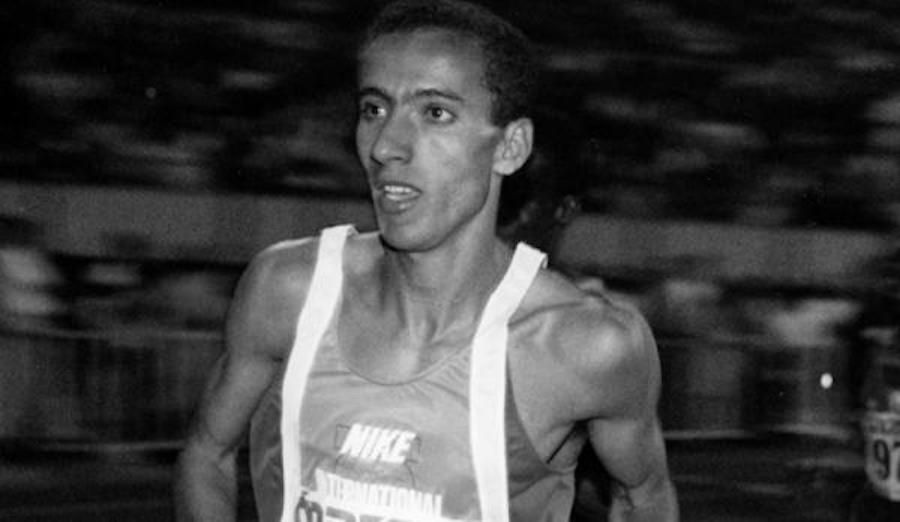
World Athletics Championships of 1999, Seville Spain
Men’s 1500m Final:
1. Hicham El Guerrouj (MAR) 3.27.65
2. Noah Ngeny (KEN) 3.28.73
3. Reyes Estevez (ESP) 3.30.57
4. Fermin Cacho (ESP) 3.31.34
5. Andres Manuel Diaz (ESP) 3.31.83
6. Laban Rotich (KEN) 3.33.32
7. David Lelei (KEN) 3.33.82
8. Driss Maazouzi (FRA) 3.34.02
9. Steve Holman (USA) 3.34.32
10 Graham Hood (CAN) 3.35.35
11. Adil Kaouch (MAR) 3.47.05
12. Noureddine Morceli (ALG) DNF
The author would like to thank World Athletics.org, the BBC, Channel Seven (Australia), Le Monde, El Pais, Diario de Madrid and Athletics Weekly.


